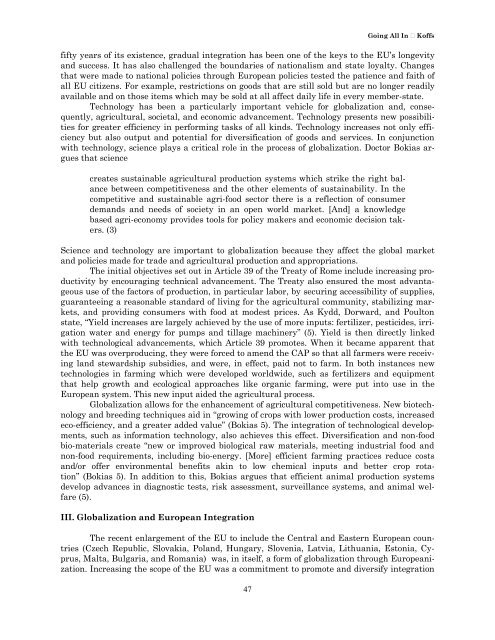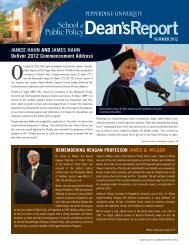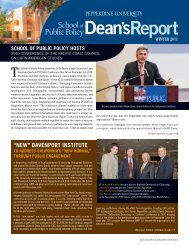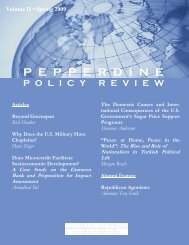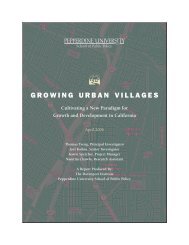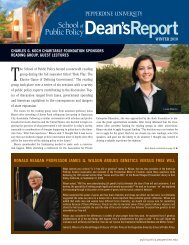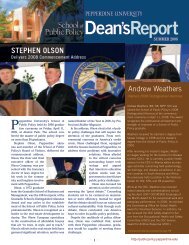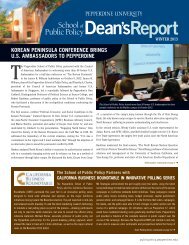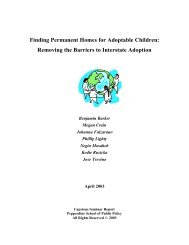Pepperdine University School of Public Policy
Pepperdine University School of Public Policy
Pepperdine University School of Public Policy
Create successful ePaper yourself
Turn your PDF publications into a flip-book with our unique Google optimized e-Paper software.
fifty years <strong>of</strong> its existence, gradual integration has been one <strong>of</strong> the keys to the EU’s longevity<br />
and success. It has also challenged the boundaries <strong>of</strong> nationalism and state loyalty. Changes<br />
that were made to national policies through European policies tested the patience and faith <strong>of</strong><br />
all EU citizens. For example, restrictions on goods that are still sold but are no longer readily<br />
available and on those items which may be sold at all affect daily life in every member-state.<br />
Technology has been a particularly important vehicle for globalization and, consequently,<br />
agricultural, societal, and economic advancement. Technology presents new possibilities<br />
for greater efficiency in performing tasks <strong>of</strong> all kinds. Technology increases not only efficiency<br />
but also output and potential for diversification <strong>of</strong> goods and services. In conjunction<br />
with technology, science plays a critical role in the process <strong>of</strong> globalization. Doctor Bokias argues<br />
that science<br />
creates sustainable agricultural production systems which strike the right balance<br />
between competitiveness and the other elements <strong>of</strong> sustainability. In the<br />
competitive and sustainable agri-food sector there is a reflection <strong>of</strong> consumer<br />
demands and needs <strong>of</strong> society in an open world market. [And] a knowledge<br />
based agri-economy provides tools for policy makers and economic decision takers.<br />
(3)<br />
Science and technology are important to globalization because they affect the global market<br />
and policies made for trade and agricultural production and appropriations.<br />
The initial objectives set out in Article 39 <strong>of</strong> the Treaty <strong>of</strong> Rome include increasing productivity<br />
by encouraging technical advancement. The Treaty also ensured the most advantageous<br />
use <strong>of</strong> the factors <strong>of</strong> production, in particular labor, by securing accessibility <strong>of</strong> supplies,<br />
guaranteeing a reasonable standard <strong>of</strong> living for the agricultural community, stabilizing markets,<br />
and providing consumers with food at modest prices. As Kydd, Dorward, and Poulton<br />
state, “Yield increases are largely achieved by the use <strong>of</strong> more inputs: fertilizer, pesticides, irrigation<br />
water and energy for pumps and tillage machinery” (5). Yield is then directly linked<br />
with technological advancements, which Article 39 promotes. When it became apparent that<br />
the EU was overproducing, they were forced to amend the CAP so that all farmers were receiving<br />
land stewardship subsidies, and were, in effect, paid not to farm. In both instances new<br />
technologies in farming which were developed worldwide, such as fertilizers and equipment<br />
that help growth and ecological approaches like organic farming, were put into use in the<br />
European system. This new input aided the agricultural process.<br />
Globalization allows for the enhancement <strong>of</strong> agricultural competitiveness. New biotechnology<br />
and breeding techniques aid in “growing <strong>of</strong> crops with lower production costs, increased<br />
eco-efficiency, and a greater added value” (Bokias 5). The integration <strong>of</strong> technological developments,<br />
such as information technology, also achieves this effect. Diversification and non-food<br />
bio-materials create “new or improved biological raw materials, meeting industrial food and<br />
non-food requirements, including bio-energy. [More] efficient farming practices reduce costs<br />
and/or <strong>of</strong>fer environmental benefits akin to low chemical inputs and better crop rotation”<br />
(Bokias 5). In addition to this, Bokias argues that efficient animal production systems<br />
develop advances in diagnostic tests, risk assessment, surveillance systems, and animal welfare<br />
(5).<br />
III. Globalization and European Integration<br />
The recent enlargement <strong>of</strong> the EU to include the Central and Eastern European countries<br />
(Czech Republic, Slovakia, Poland, Hungary, Slovenia, Latvia, Lithuania, Estonia, Cyprus,<br />
Malta, Bulgaria, and Romania) was, in itself, a form <strong>of</strong> globalization through Europeanization.<br />
Increasing the scope <strong>of</strong> the EU was a commitment to promote and diversify integration<br />
47<br />
Going All In K<strong>of</strong>fs


